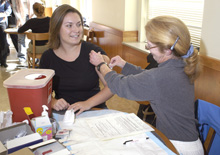Campus News
October 6, 2010
University flu shot clinics open for business

As the first fall chill settles on campus, it's time to pull on a sweater and roll up the sleeves for that prickly rite of season: the flu shot.
Fortunately, this year's flu season is expected to be relatively tame compared to last year, when the novel H1N1 flu strain, also known as swine flu, was declared a global pandemic. Still, Emory health officials are urging everyone ages 6 months and older to protect themselves with a flu shot.
"Even though we are unlikely to have a significant amount of H1N1 illness in the U.S. this year, seasonal influenza is always a big deal," says Student Health Services Executive Director Michael Huey. The CDC estimates that more than 200,000 people are hospitalized for seasonal-flu-related complications each year.
Beginning Oct. 11 through Dec. 8, the University will hold 24 flu shot clinics around campus. View the full University schedule (PDF).
Flu shots are free to benefits-eligible Emory faculty and staff who bring an employee ID and Emory insurance card. A wellness specialist from the Faculty Staff Assistance Program (FSAP) will distribute a variety of information at the clinics, including materials on cold and flu prevention and management.
"We want to provide resource information that will encourage individuals to take charge of their health and well-being," says FSAP Director Paula Gomes.
Emory Healthcare, which requires all employees to get annual flu shots, is offering its own flu shot "marathons." View the complete Healthcare schedule (PDF).
This year's flu shot packs protection against three flu virus strains, including the H1N1 virus.
The University, excluding Emory Healthcare, received nearly 8,000 doses of flu vaccine last year, including nearly 3,000 H1N1 flu vaccines. This year, with the combined vaccine, the University expects to receive 6,100 doses, Huey says.
Even people who received the seasonal flu and H1N1 flu vaccines last year need this year's vaccine to stay protected, he adds. Flu shots are particularly important for individuals with asthma, heart disease, diabetes, chronic illnesses that weakens the immune system and for people over age 65.
After the shot: Tips to stay healthy
• Eat nutritious foods.
• Engage in regular exercise to manage stress and boost the immune system.
• Get plenty of rest.
• Wash hands frequently.
• Dress in layers.
• If you exhibit flu-like symptoms, stay home and avoid contact with others until 24 hours after the fever is down without the use of medication.
